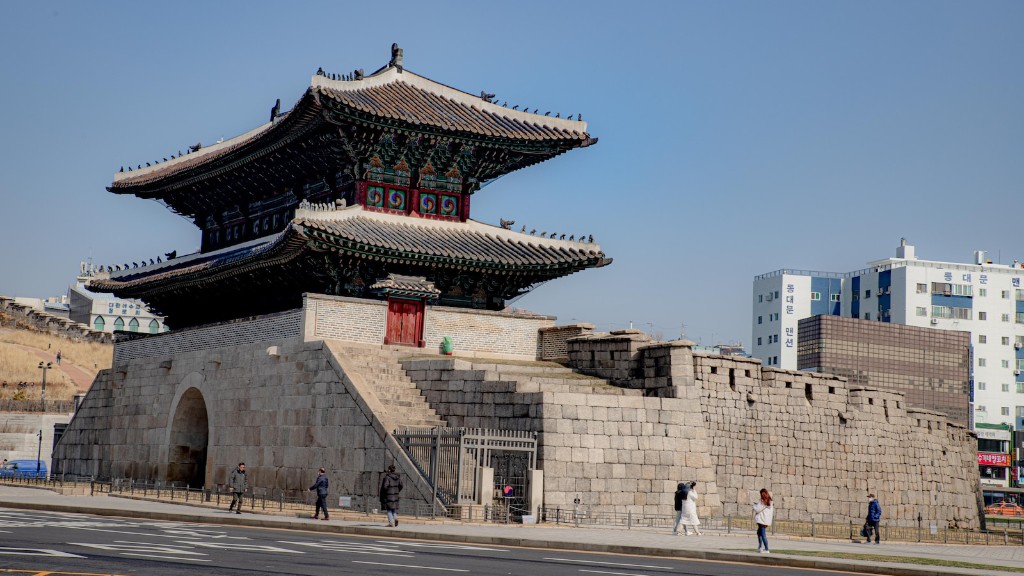North Korea and the United States of America have long been engaged in a hostile relationship, with each side having the capability to wage war on the other. The possibility of a North Korean attack on the USA never seems to disappear off the radar of international security – with reports of missile launches, increasingly advanced nuclear technology, and extensive military exercises, it is no wonder why the threat is taken so seriously. In this article, we will explore the reasons why North Korea may decide to attack the US and examine the risks that would be associated with such an event.
Firstly, North Korea has long viewed the US as a threat to its existence, and it is likely that Kim Jong-un considers an attack on the US to be a way of reasserting his power and enhancing his authority. This is borne out by his frequent rhetoric, which speaks of North Korea’s willingness and ability to defend itself against any foreign threat. North Korea also has a long history of hostility towards the US, with relations souring ever since the Korean War which saw the North side backed by the Soviet Union, and the South backed by the USA and its allies.
An attack by North Korea on the USA would also be highly provocative, as it would drastically upset the current balance of power in international relations. This could have serious repercussions, as it would likely lead to a regional war in the Korean peninsula, and possibly open the door for Russia or China to intervene on North Korea’s behalf, further destabilizing the situation. Additionally, it is not impossible for North Korea to launch nuclear weapons that can reach the US – although it is argued that such an act would be suicidal, it could be argued that it may be intended to show North Korea’s defiance and strength.
In addition to a full scale war, North Korea could opt to launch cyber-attacks against the USA, targeting its critical infrastructure such as power grids and communication systems. Cyber-attacks have been popular amongst countries in the recent years seeking to cause disruption and chaos without drastically increasing tensions, and North Korea has a number of cyber-capabilities that it could use to carry out this form of attack.
However, it is important to recognize that whilst the threat of war is real, there is also a strong argument for avoiding such a conflict as it would cause significant damage to all parties. This is borne out by the statement released by the United Nations Security Council, which call for all sides to show restraint and diplomacy. Furthermore, it should be acknowledged that the US has several defense systems in place, such as the Patriot Air and Missile Defense System, and the Aegis Ballistic Missile Defense System, which should be able to protect it against any possible North Korean attack.
Economic Incentives
A major factor in any North Korean consideration of war would be the economic incentives. North Korea suffers from a severely underdeveloped economy, and much of its population lives in extreme poverty due to food shortages, lack of access to basic services, and rampant corruption. North Korea gains most of its money from selling arms and other military related products, and it is therefore possible that war with the US could be seen as a means to increase their financial wealth. Furthermore, North Korea is aware that a war with the US could result in significant military and economic aid from its regional allies, such as China, to help rebuild its crumbling infrastructure.
Given this, it appears that the economic aspect of a war with the US would be attractive to the North Korean regime. It should also be noted that other economic factors, such as the control of resources by the US in the form of UN sanctions, have been used as an excuse for North Korea’s belligerence in the past, and could be used as a justification for any potential attack.
Risks
Despite the potential advantages of war with the USA, the risks are far greater. The US is a powerful nation, with a range of powerful weapons in its arsenal, such as nuclear weapons and an extensive network of military bases. The US should also have the backing of many of its allies, such as NATO, and its economic power should be enough to counter any economic incentives for North Korea. Furthermore, the US has an extensive missile defense system which can shoot down any incoming missiles, limiting North Korea’s ability to do significant damage.
The risks are not limited to North Korea, however, as a war could also have disastrous consequences for the US. Not only would there be heavy casualties and destruction, but it could also result in a dramatic rise in oil prices, due to the disruption to international trade, and a potential conflict in the Middle East as a result of the US involvement.
In conclusion, it appears that North Korea has a number of incentives for attacking the US, but it is important to recognize the risks associated with such a conflict. It is therefore essential that the US and North Korea continue to engage in diplomatic efforts, and both sides should show restraint in order to avoid a catastrophic conflict.
The Costs of War with North Korea
A war between the United States and North Korea could come with a high cost, both in economic and human life. A full-scale war with the North Korean military could potentially take millions of lives and cost hundreds of billions of dollars in infrastructure, medical, and military costs. The United States would have to mobilize it’s military resources quickly, which could potentially require the draftee of reservists and the potential participation of its allies. These costs spawn a deep debate over whether military conflict is even an option.
The costly consequences could extend to North Korea as well. A war could potentially disrupt North Korea’s already fragile economy, reducing its already limited access to international markets. It would also take the life of thousands of North Korean soldiers and civilians, potentially leading to humanitarian crises. North Korea’s population is already facing food and health security issues, which would be further exacerbated by a war.
A war with North Korea would likely also involve other countries in the region and could possibly further destabilize the region, creating a power vacuum. It has been argued that countries such as China and South Korea could be drawn into the escalating conflict and be met with a fierce US response, resulting in a larger-scale confrontation in the region.
This $o the decision to go to war with North Korea comes with great consequences and possible risks. The economic cost is staggering and the potential loss of life is devastating. The United States must carefully weigh the costs and the benefits before deciding to engage in any form of military conflict with North Korea.
Regional Implications of War
A potential war between the United States and North Korea would not be limited to just the two countries involved, it would have wide ranging and far reaching implications for the region as a whole. South Korea, China, Japan, and Russia would all be affected by the war in different ways. The immediate and long term impact would depend on how the war plays out, the strategy employed by the two sides, and the level of commitment of the other world powers.
South Korea would be the first to bear the full brunt of any war between the US and North Korea due to its proximity, making it highly vulnerable. It may become bogged down in a lengthy conflict and incur thousands of casualties, both military and civilian. South Korea would most likely be heavily reliant on US aid and military personnel, as well as possibly the United Nations to help them deal with any war related consequences.
China, on the other hand, may have to deal with a large influx of refugees from North Korea. Its economy could also suffer from the disruption of its exports and imports, in the form of sanctions imposed by the United States and its allies. China also has an interest in preventing a war due to its long term goal of stability in the region, as it could potentially lead to a conflict directly involving China.
Japan, might also become subject to North Korean attack as it is seen by North Korea as a potential enemy. Japan may be wary of becoming increasingly involved in any war between the US and North Korea, a conflict that it might not be able to handle due to its limited capacity for the deployment of military personnel and assets.
Russia is unlikely to support a US-led war against North Korea due to its longstanding relationship with Pyongyang, but it could become another area for conflict if countries such as China become more involved. In general, it appears that Russia is in favor of a diplomatic solution, rather than a military one, which would likely be more cost effective and cause less international tension.
International Reactions to War
The potential war between the United States and North Korea could potentially trigger a series of international responses, both positive and negative. Countries such as the United Kingdom, France and Germany, who are members of the NATO alliance, would be likely to sympathize with the US, and may provide military support if necessary. The US may even receive support from other countries, such as China and Russia, who have an interest in maintaining the stability of the region. It is likely that the US could also receive support from other countries in the form of economic and humanitarian aid.
On the other hand, the war could also be met with international condemnation from countries such as Iran, China and Russia, as well as from international organizations such as the United Nations. The war could also potentially lead to an increase in international tensions, as countries may become wary of US militarism, particularly if the war is seen as an attempt by the US to expand its influence and domination in the region.
In conclusion, the potential war between the United States and North Korea is highly complex and could come with severe consequences, both regionally and internationally. It is therefore essential that all sides take a cautious approach and seriously consider the risks, and the potential costs, associated with any use of force.





